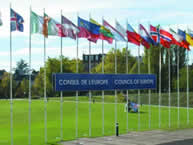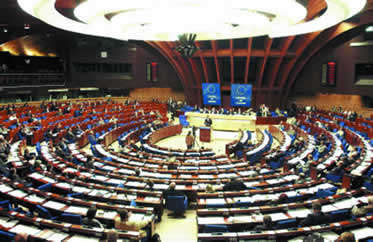European Parliament:
June Elections
by Rodolfo Cattani
To respect human rights and guarantee equal opportunity for
persons with disabilities. This is what is stated in the Manifesto elaborated by
the European Parliament of Disabled People.
Within the framework of the European Year of People with Disabilities,
the European Parliament of Disabled People has met in Brussels on November 12,
2003 and has adopted a Manifesto for the elections of the European Parliament in
June 2004.
The Manifesto will be disseminated throughout Europe by the
National Councils of Disabled People and European Organizations representing
persons with disabilities. It is an opportunity for future members of the new
European Parliament to make strong commitments to concrete changes that will
ensure that disabled people can fully enjoy their civil, social, economic and
political rights.
Considering that persons with disabilities and their
families make up 15% of the population, society should take concerns of disabled
people into account. .
.
Disability issues are issues for everyone and the European
Parliament of Disabled people calls on prospective MEPs to listen and address
their demands. There are still too many barriers, which keep persons with
disabilities from fully participating in society and their resolution is a
responsibility of European and national institutions.
The 200 official
delegates of the European Parliament, representing 37 million disabled people
and parents of disabled people, called upon all candidates running as
prospective members of the European parliament and all political parties to
adopt the following commitments, which are crucial to respecting the human
rights of disabled people in the society of an enlarged Europe.
Human rights legislation
1) Adopt
disability specific directive: It is time to adopt a horizontal
anti-discrimination directive, which removes barriers in all areas of EU
competence to enable disabled people to achieve their full potential in their
life and in society, and enjoy goods and services that are accessible to other
citizens.
2) Support national non-discrimination
legislation: Support and campaign for the adoption or improvement at national
level of legislation that prohibits discrimination on the basis of disability in
areas of personal and social life. It is necessary to ensure there are strict
and effective sanctions in cases of non-compliance.
3)
Transpose Directive on Equal Treatment in Employment immediately: The Framework
Directive on Equal Treatment in Employment and Occupation, adopted by the
European Union in 2000, must be immediately and fully transposed in all member
states to prohibit discrimination on the basis of
disability.
4) Support UN Convention on the human rights of
persons with disabilities: The European Parliament will have to support the
adoption by the United Nations of a convention, which protects the rights and
dignity of persons with disabilities. Such convention is to be legally binding
in nature with strong and effective monitoring mechanisms and sanctions in cases
of non-compliance.
A Europe for all
5) Promotion of
mainstreaming: Disability policy should be recognized across all areas of
national policy specifically for the purpose of achieving equality of disabled
persons.
6) Facilitate funding conditions: Support the
introduction of accessibility criteria attached to the disbursement of European
funds and consideration of the disability dimension in all projects. Involve
disabled people's representatives in the development of the criteria for the
allocation of funds.
7) Create a European Parliament for
all: The European Parliament should be an example of good practice, guaranteeing
to all, including persons with disabilities, a full and equal accessibility to
facilities, documents, meetings and equal opportunities in
employment.
8) Endorse Madrid Declaration: 
 The
Madrid Declaration, approved in 2002 by the European Congress on Disability, is
the ideal framework in favour of all disability policy during the European Year
of People with Disabilities. Deciding on its own adoption of the Declaration,
the European Parliament will lay down univocal and innovative standards for
disability policy planning at all levels.
The
Madrid Declaration, approved in 2002 by the European Congress on Disability, is
the ideal framework in favour of all disability policy during the European Year
of People with Disabilities. Deciding on its own adoption of the Declaration,
the European Parliament will lay down univocal and innovative standards for
disability policy planning at all levels.
9) Join Disability Intergroup of the European
Parliament: The newly elected MEPs are invited to become members of the
Disability Intergroup, an informal grouping of MEPs from all nationalities and
major political groups.
10) Consult disabled constituents:
Constituents who have a disability and their representative organizations should
have the opportunity to develop a constructive and courteous dialog with
MEPs.
Full and equal access to democracy
11)
Encourage consultation: When drafting their electoral programmes,
parties should take into account issues and demands of organizations
representing persons with disabilities and parents or guardians who are unable
to represent themselves directly.
12) Guaranteeing
accessible and inclusive political and electoral campaigns: Political and
electoral campaigns should reach all voters with disabilities and include as key
commitments the demands of such constituents. Campaign messages should be made
available in alternative formats  such as Braille, large print, audio and electronic text. Information
should be available in plain easy-to-read language and, where necessary, in sign
languages.
such as Braille, large print, audio and electronic text. Information
should be available in plain easy-to-read language and, where necessary, in sign
languages.
13) Ensure accessibility of information about
election procedure and methods of the vote itself: Persons with disabilities
have the right to receive all necessary information on how to actively
participate in the elections: The polling stations should be made accessible and
the integrity of secret ballots ensured for all constituents including those
with a disability. Electronic voting systems should be incremented and updated
guaranteeing full accessibility and usability for all
voters.
14) Encourage disabled citizens to run as
candidates: Since candidate lists should be representative of society, persons
with disabilities should be able to participate in the electoral process and run
as candidates.
Nothing about us without us.
 .
.

 The
Madrid Declaration, approved in 2002 by the European Congress on Disability, is
the ideal framework in favour of all disability policy during the European Year
of People with Disabilities. Deciding on its own adoption of the Declaration,
the European Parliament will lay down univocal and innovative standards for
disability policy planning at all levels.
The
Madrid Declaration, approved in 2002 by the European Congress on Disability, is
the ideal framework in favour of all disability policy during the European Year
of People with Disabilities. Deciding on its own adoption of the Declaration,
the European Parliament will lay down univocal and innovative standards for
disability policy planning at all levels. such as Braille, large print, audio and electronic text. Information
should be available in plain easy-to-read language and, where necessary, in sign
languages.
such as Braille, large print, audio and electronic text. Information
should be available in plain easy-to-read language and, where necessary, in sign
languages.